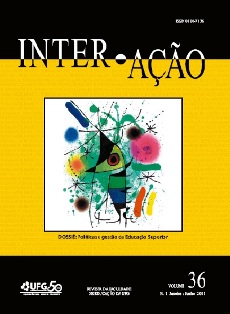CONFIGURATIONS OF HIGHER EDUCATION POLICIES AND REFORMS IN BRAZIL
DOI:
https://doi.org/10.5216/ia.v36i1.15033Abstract
This study analyzes reforms in higher education in Brazil from the 1930s to recent times. This incursion in time shows a movement towards expansion at this level of education, due to educational policies. The tools used herein are bibliographical and documentary research and analysis. While the 1931 and 1968 reforms focused on the expansion of higher education for the elite, the reforms which followed reached expansion rates similar to those of the education-for-all model, brought about by policies for the private and public sectors centered on their management organizations. The study points out that if more efficient social policies are not provided for the public sector there is a risk of intensification of the process of oligopolization and commodification of higher education.Downloads
Downloads
Published
How to Cite
Issue
Section
License
Inter-Ação uses the Creative Commons Attribution 4.0 License for Open Access Journals (Open Archives Initiative - OAI) as the basis for the transfer of rights. Open access means making documents available on the Internet free of charge, so that users can read, download, copy, distribute, print, search, or link to the full text of documents, process them for indexing, use them as input data for software programs, or use them for any other lawful purpose, without financial, legal, or technical barriers.
Authors publishing in this journal agree to the following conditions:
1) Authors retain copyright and grant the journal the right of first publication, with the work simultaneously licensed under the Creative Commons Attribution License, which permits redistribution of the work with attribution and first publication in this journal.
2) Authors are permitted to enter into additional, separate agreements for non-exclusive distribution of the version of the work published in this journal (e.g., for publication in an institutional repository or as a book chapter), with attribution and first publication in this journal.
3) Authors are permitted and encouraged to publish and distribute their work online (e.g. in institutional repositories or on their home page) at any time before or during the editorial process, as this may generate productive changes as well as increase the impact and citation of the published work.















